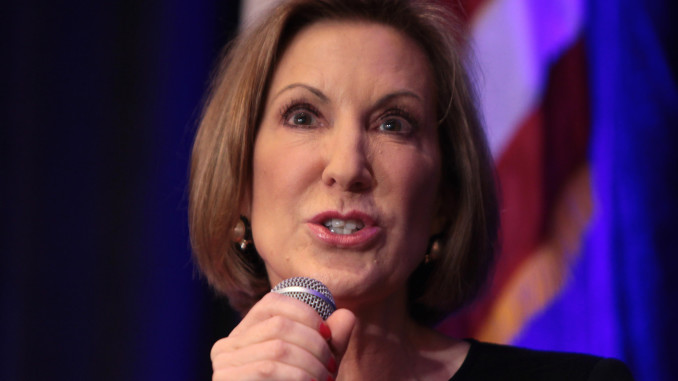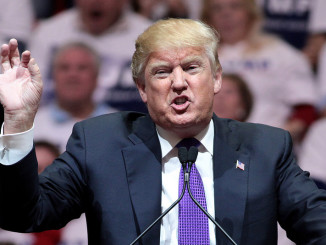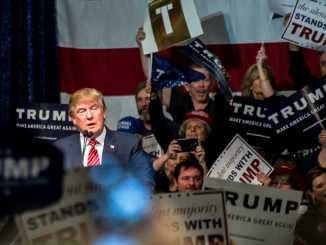
An expanded, revised version of this article is now available in the new book: The Media Versus the Apprentice: The Devil Mr. Trump.
MEDIA MEME:
Donald Trump viciously attacked candidate Carly Fiorina by saying that her face was ugly, so she should not be President.
WHAT REALLY HAPPENED:
Trump complained about Fiorina’s “face” but then said that he was just talking about her “persona,” not her physical appearance. Critics insisted that Trump was lying, that he really attacked her physical appearance. At the same time, ironically, news commentators strongly criticized Fiorina for her facial expressions and demeanor. News commentators’ remarks, even by some liberal women, were worse than what Trump had said. They said that Fiorina looked angry, demented, like a Halloween mask, and that she would do better on the radio.
Early fall 2015. Donald Trump was eating informally with some campaign staffers. His loosened tie was slung over his shoulder, while the news played on TV. A fellow Republican candidate, Carly Fiorina, showed up on TV, and Trump dismissed her chances of winning.
A journalist for Rolling Stone was present, and he reported what Trump said:
“Look at that face! Would anyone vote for that? Can you imagine that, the face of our next president?! I mean, she’s a woman, and I’m not supposed to say bad things, but really, folks, come on. Are we serious?”
When the cover story for Rolling Stone was published, many people were shocked and offended by Trump’s comment about Fiorina. Hundreds of reporters, news magazines, and blogs complained in outrage that Trump had viciously attacked Fiorina for her looks. Even reporters in foreign countries complained. They claimed that Trump was sexist. They claimed that he said that Fiorina was ugly. They claimed that he suggested that women should not be President.
Immediately, Trump defended himself. He admitted that he “probably” was quoted correctly by the reporter for Rolling Stone. But he said that actually he was not criticizing Fiorina’s looks, but just “her persona.”
Many people did not believe him. They insisted that he meant to insult Fiorina’s physical appearance.
But Trump noted that, actually, many people ridicule him for his physical appearance. He told Fox News: “When I get criticized constantly about my hair, nobody does a story about ‘Oh isn’t that terrible, they criticized Donald Trump’s hair.’”
Actually, it’s true. Trump had been ridiculed for his looks millions of times, far more than any candidate for the Presidency in the 2016 elections. And countless many of those criticisms happened before he said anything about Fiorina.
When the “that face” incident happened, I was not sure whether Trump was criticizing Fiorina in a really big way. I certainly thought it was rude, after all, he said “vote for that,” as if she were an object, or her looks should matter in the elections. But he didn’t even use a single critical adjective.
If you’re curious to see why someone might not be very offended by his statement, please read on.
In the second Republican Debate, Trump tried to fix it. He gave a compliment to Fiorina. He said: “I think, she’s got a beautiful face, and I think she’s a beautiful woman.”
As usual, many people disbelieved him because he said something positive. They thought he was a hypocrite. A liar. But they believed his previous negative words in the worst possible interpretations.
I imagine that people who think that Fiorina in fact is unattractive could not possibly imagine that Trump originally referred to her expression, instead of literally, her face.
At the end of that CNN Republican Presidential debate, many commentators agreed that Carly Fiorina had the best performance. I agreed: she won the debate. But right then, I noticed something surprising. Several commentators, such as Charles Krauthammer, said that there was one flaw in Fiorina’s performance. She hardly smiled, she seemed too serious, stern, and overall, “her demeanor,” was not pleasant.
Krauthammer said that Fiorina earned a grade of A– in the debate. She won the debate, he said. But there was the issue of how she looked. Here’s the discussion between Bill O’Reilly and Charles Krauthammer:
Krauthammer: I give her the minus slightly because she had a severe demeanor.
O’Reilly: Yes, I noticed that as well. If she had smiled a couple of times…
Krauthammer: She looked –
O’Reilly: She really looked teed off!! She looked teed off. [angry, annoyed]
Krauthammer: She had a right to be, and she looked uh rather tense.
O’Reilly: Yeah, but you know how politics are; people want other people to be accessible…
Krauthammer: If you heard it on the radio [not seeing her face], she would’ve had an A.
At that moment, hearing Krauthammer, I suddenly understood Trump. All those things: not smiling, looking stern, angry, etc., can be summed up by reference to someone’s face. But since Trump said “persona,” nobody believed him. What if he had said “her demeanor”?
I saw no news articles, the next day, complaining about how O’Reilly and Krauthammer had criticized how Fiorina looked, or for having said that she would come across better on the radio.
If it were true or possible that Trump too was referring to Fiorina’s demeanor instead of her actual face, when he first criticized her, then there should exist other instances in which Trump similarly used the words “look” and “face” to refer to someone’s expression instead of one’s face.
Such instances do exist. For example, in a book of 2009, Trump wrote: “People are busy thinking about themselves. They will take a quick look at your face to see if you think you are valuable and important to yourself…”
I remember, as a child, sometimes my father asked me, “What’s up with that face?” It never offended me, he was just asking how I was feeling, why did I have some particular expression. He did not mean: “You are ugly.”
Anyhow, Fiorina soon heard the remarks by various commentators about how she looked during the debate. So, in the next debate, she began it with a big grin.
Soon Fiorina was criticized again. This time is was by the liberal women hosting the ABC show, The View:
Michelle Collins: [laughing] “She kicked off, uh, her thing, saying: ‘You know people tell me that I didn’t smile enough during the last debate,’ she looked demented! I mean she did not, her mouth did not downturn one time! She was like—
Joy Behar: [laughing] “–like a Halloween mask, I like that!”
Michelle Collins: [laughing] “A smiling Fiorina, can you imagine?”
Days later Fiorina spoke with the hosts of The View, and very fairly said that the election should be about issues, about character and track record, and “not what somebody looks like.”
Just as people often mock Donald Trump for his looks, these women criticized Fiorina for her appearance.
Michelle Collins tried to explain herself to Fiorina:
“the demented comment was a poor choice of words, but it was really responding to something you said during the debate, that people were telling you to smile more, and to me it felt like it was not your natural kind of state of mind, it was not a thing on your looks, it was more your expression…”
Perhaps Collins could have said her “persona,” or her “demeanor.”
But back to Trump. The end result was that people still mention his supposedly vicious attack on Fiorina: that he said “that face.” But they don’t care that Trump is the subject of many more offensive insults, caricatures, piñatas to be smashed, and even, yes, Halloween masks. Talk about a double standard.
Trump provided countless many people an opportunity to freely enjoy ridiculing someone for the way he looks. They said he had an orange, fat, clown face, a wig, a nasty combover, short fingers, a small penis, a micro-penis, etc. At the same time, many of those same people, were outraged, disturbed, stunned, and offended that he had dared to allude to the way another candidate looks, he had dared to refer disparagingly to somebody’s face, even if he didn’t even use a single descriptive adjective.
Needless to say, people felt that therefore they had a license to criticize him. They could complain: “But he didn’t just mock Fiorina, he has criticized other people too, even women.” And they could reassuringly believe: “But he was the first to criticize! I would never criticize anybody’s looks except that he criticized other people first.”
Hence media outlets eagerly collected the various insults that came from Trump. This article is just about one incident. I’ve written about a few other incidents separately.
An expanded, revised version of this article is now available in the new book: The Media Versus the Apprentice: The Devil Mr. Trump.
Alberto A. Martinez is a professor of History at the University of Texas at Austin.
Next: The Myth of the Muslim Database




i would not, i mean, i would not vote for her facial expression. and she ran HP into the ground. and i wouldn’t vote for trumps face either!